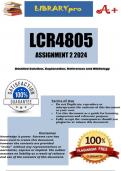Exam (elaborations)
LCR4805 Assignment 2 (COMPLETE ANSWERS) 2024 (615825)
- Institution
- University Of South Africa
LCR4805 Assignment 2 (COMPLETE ANSWERS) 2024 (615825) ... 100 % TRUSTED workings, explanations and solutions. For assistance call or W.h.a.t.s.a.p.p us on +/ 2/ 5/ 4 /7 /7 /9 /5 /4 /0 /1 /3 /2 . LCR4805 Assignment 2 Questions Unique code: 615825 1. QUESTION 1 Shortly after a bomb explosion i...
[Show more]



